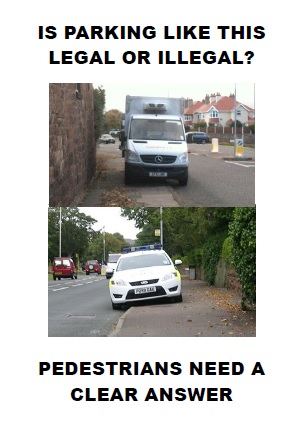
Who is responsible for pedestrian safety in the UK?
A case study on the legality of footway parking
A survey of 78 ministers, other MPs, council officers, councillors, police officers and others found them to be almost unanimous that footway parking is someone else's problem.
Summary

Because of apparent confusion among those responsible for pedestrian safety in the UK, a survey on the legality of footway parking was carried out. The aims were (a) to address the practical problem of protecting vulnerable pedestrians from an increasing threat to their safety and mobility from footway parking, and (b) to attempt to throw light on the structures and functioning of the UK systems of national and local government (and the attitudes of individuals within them) that ought to be improving pedestrian safety but which appear to be failing.
A survey letter was sent on 27 February 2014 to 78 named individuals occupying a range of positions within the UK. The list comprised the Prime Minister, seven other UK Government ministers, Select Committee MPs, individuals with a national policing role, and local politicians, council officers, police officers and other officials in the author's locality (Wirral, Merseyside).
The survey consisted of a single question "Is parking like this legal or illegal?" referring to photographs of two vehicles (a supermarket delivery van and a Merseyside Police car - see panel) parked half way across footways, together with explanatory notes as to why a clear answer is needed, a covering letter, and a stamped addressed envelope for reply. Read more about the methods here.
Of the 78 individuals surveyed, four (5%) clear answers were received, all from councillors in various capacities. There were 31 other answers.
- The reply from the Prime Minister was that the Department for Transport would reply.
- The Department for Transport gave no clear answer, but indicated that local authorities and the police have responsibility.
- The National Lead on Roads Policing stated that responsibility had been transferred from the police to local authorities.
- There was a refusal to respond from Wirral Council, saying that the issues are beyond their legislative scope.
- No responses were received from the five Merseyside Police officers surveyed.
- No clear answers were received from the members of the House of Commons Transport Select Committee.
- No response was received from the Merseyside Police and Crime Commissioner except for an acknowledgement.
The consensus from the four clear responses received and from a review of documents and websites was that footway parking is generally illegal through the prohibition on driving on footways, but that it can be legalised in particular locations via Traffic Regulation Orders.
The non-responses, vague responses, and advice to contact someone else mirror the anecdotal experiences of people in Merseyside and around the UK who have contacted those in positions of authority about the problem.
There seems to be a stark contrast between attitudes to pedestrian safety and attitudes to the safety of other modes of travel.
Those who care about pedestrian safety should not rely on those in authority to take action to protect pedestrians.
Acknowledgements
In carrying out this survey, there were many helpful comments from colleagues in Wirral Pedestrians Association and Merseyside Cycle Campaign.
